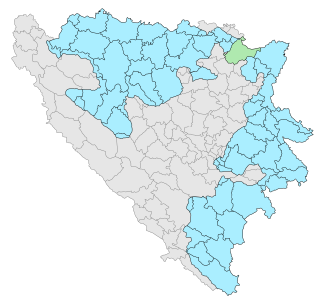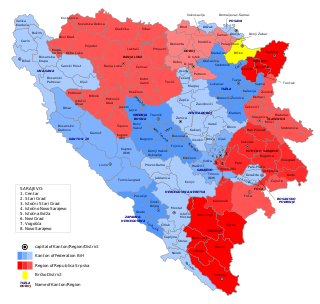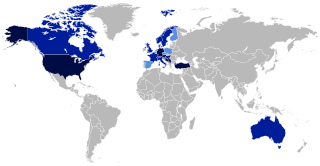See also
| Sovereign states |
|
|---|---|
| States with limited recognition | |
| Dependencies and other entities | |
| | This Bosnia and Herzegovina-related article is a stub. You can help Wikipedia by expanding it. |
Fauna of Bosnia and Herzegovina may refer to:

Bosnia and Herzegovina, sometimes known as Bosnia-Herzegovina and informally as Bosnia, is a country in Southeast Europe, situated on the Balkan Peninsula. It borders Serbia to the east, Montenegro to the southeast, and Croatia to the north and southwest. In the south it has a 20 kilometres long coast on the Adriatic Sea, with the town of Neum being its only access to the sea. Bosnia has a moderate continental climate with hot summers and cold, snowy winters. In the central and eastern regions, the geography is mountainous, in the northwest it is moderately hilly, and in the northeast it is predominantly flat. Herzegovina, the smaller, southern region, has a Mediterranean climate and is mostly mountainous. Sarajevo is the capital and the largest city.

The General Framework Agreement for Peace in Bosnia and Herzegovina, also known as the Dayton Agreement or the Dayton Accords, and colloquially known as the Dayton in ex-Yugoslav parlance, is the peace agreement reached at Wright-Patterson Air Force Base near Dayton, Ohio, United States, finalised on 21 November 1995, and formally signed in Paris, on 14 December 1995. These accords put an end to the three-and-a-half-year-long Bosnian War, which was part of the much larger Yugoslav Wars.

The Federation of Bosnia and Herzegovina is one of the two entities composing Bosnia and Herzegovina, the other being Republika Srpska. The Federation of Bosnia and Herzegovina consists of ten autonomous cantons with their own governments and legislatures.
The presidency of Bosnia and Herzegovina is a three-member body which collectively serves as head of state of Bosnia and Herzegovina. According to Article V of the Constitution of Bosnia and Herzegovina, the presidency comprises three members: one Bosniak, one Serb, and one Croat. The Bosniak and Croat members are elected from a joint constituency in the Federation of Bosnia and Herzegovina, whilst the Serb member is elected from voters in Republika Srpska.
The Council of Ministers of Bosnia and Herzegovina, often called Government of Bosnia and Herzegovina, is the executive branch of the government of Bosnia and Herzegovina. It is also called the Cabinet.

The chairman of the Presidency of Bosnia and Herzegovina is the presiding member of the Presidency of Bosnia and Herzegovina, which collectively serves as head of state of Bosnia and Herzegovina.

The Football Association of Bosnia and Herzegovina, based in Sarajevo, is the chief officiating body of football in Bosnia and Herzegovina. The Bosnian football association was founded as the Sarajevo football sub-association of Yugoslavia in 1920. In 1992, the association was re-founded as the Football Association of Bosnia and Herzegovina.

The ten cantons of the Federation of Bosnia and Herzegovina, one of the two political entities of Bosnia and Herzegovina, are its federal units with a high level of autonomy. The cantons were established by the Law on Federal Units (Cantons) on 12 June 1996 as a result of the Washington Agreement of 1994 between the representatives of the Bosnian Croats and Bosniaks.

The Central Bosnia Canton is one of 10 cantons of the Federation of Bosnia and Herzegovina in Bosnia and Herzegovina.

The Bosnia and Herzegovina national football team represents Bosnia and Herzegovina in men's international football competitions, and is governed by the Football Association of Bosnia and Herzegovina. Until 1992, Bosnian footballers played for Yugoslavia.

The House of Representatives of Bosnia and Herzegovina is one of the two chambers of the Parliamentary Assembly of Bosnia and Herzegovina, with the other being the House of Peoples of Bosnia and Herzegovina. The chamber consists of 42 members which are elected by party-list proportional representation. 28 members are elected from the Federation of Bosnia and Herzegovina, and 14 from Republika Srpska. Members serve for terms of four years. The current membership of the chamber was elected on 2 October 2022.

Under the "Law on Territorial Organization and Local Self-Government" adopted in 1994, Republika Srpska was divided into 80 municipalities. After the conclusion of the Dayton Peace Agreement, the law was amended in 1996 to reflect the changes to the entity's borders and now provides for the division of Republika Srpska into 64 municipalities.

In Bosnia and Herzegovina, the smallest administrative unit is the municipality. Prior to the 1992–95 Bosnian War there were 109 municipalities in what was then Socialist Republic of Bosnia and Herzegovina. Ten of these formed the area of the capital Sarajevo.

The Socialist Republic of Bosnia and Herzegovina, commonly referred to as Socialist Bosnia or simply Bosnia, was one of the six constituent federal states forming the Socialist Federal Republic of Yugoslavia. It was a predecessor of the modern-day Bosnia and Herzegovina, existing between 1945 and 1992, under a number of different formal names, including Democratic Bosnia and Herzegovina (1943–1946) and People's Republic of Bosnia and Herzegovina (1946–1963).

Bosnia and Herzegovina sent athletes to the Summer Olympic Games under its own flag for the first time in 1992. Bosnian athletes competed under the Yugoslav flag until the breakup of that country. Along with Albania, Andorra, Malta and Monaco, Bosnia and Herzegovina is one of five current European participants that have never won an Olympic medal.

Bosnia and Herzegovina fell under Austro-Hungarian rule in 1878, when the Congress of Berlin approved the occupation of the Bosnia Vilayet, which officially remained part of the Ottoman Empire. Three decades later, in 1908, Austria-Hungary provoked the Bosnian Crisis by formally annexing the occupied zone, establishing the Condominium of Bosnia and Herzegovina under the joint control of Austria and Hungary.

The Bosnia and Herzegovina women's national football team represents Bosnia and Herzegovina in international football and is controlled by the Football Association of Bosnia and Herzegovina.

Bosnians are people native to the country of Bosnia and Herzegovina, especially the historical region of Bosnia. As a common demonym, the term Bosnians refers to all inhabitants/citizens of the country, regardless of any ethnic, cultural or religious affiliation. It can also be used as a designation for anyone who is descended from the region of Bosnia. Also, a Bosnian can be anyone who holds citizenship of the state of Bosnia and Herzegovina and thus is largely synonymous with the all-encompassing national demonym Bosnians and Herzegovinians.